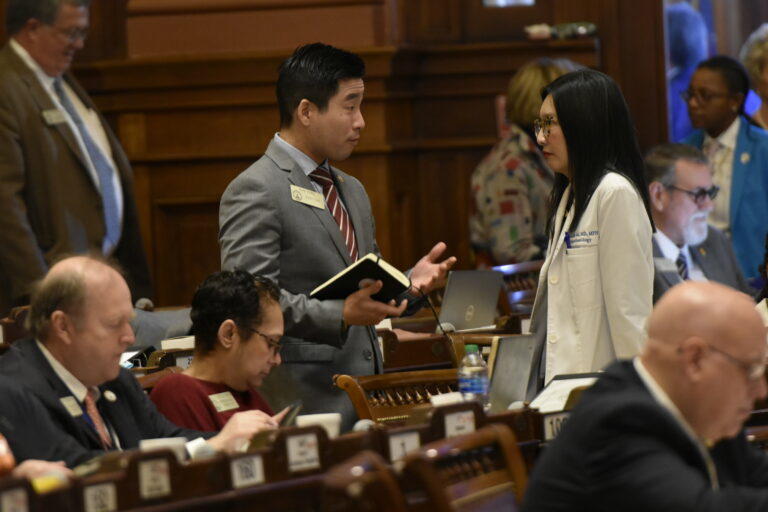
Caption
Businesses and people from countries deemed enemies of the U.S. could have a harder time buying farmland under a proposed law.
Credit: Ross Williams/Georgia Recorder

Businesses and people from countries deemed enemies of the U.S. could have a harder time buying farmland under a proposed law.
A bill aiming to prevent agents of foreign countries deemed hostile to the United States from buying farmland in Georgia is set to go to Gov. Brian Kemp’s desk after passing the House along party lines Thursday.
In a heated floor debate, Democrats and Asian-American lawmakers said the bill would do little to defend U.S. interests but could increase unfair scrutiny of and racism against Asian-Americans and others.
Businesses housed in countries with governments designated as a foreign adversary by the United States Secretary of Commerce — China, Cuba, Iran, North Korea, Russia and Venezuela — would be banned from purchasing agricultural land under Senate Bill 420.
So would any non-U.S. citizen or legal resident who is an agent of one of those governments, provided they have either been absent from the U.S. for six months out of the last year before the purchase or absent from Georgia for two months out of the year.
The proposed law would not apply to residential property, and businesses leasing land from an owner for “agricultural research and development or experimental purposes” would also be exempt.
Any such foreign agent would have until July 2027 to get rid of their property.
Republicans said the measure is a common-sense way to protect the nation’s food supply.

Rep. David Clark.
“There are two things that are vital to every country’s national security: a water supply and a food supply,” said Buford Republican David Clark. “This bill simply protects our valuable agricultural land that produces our food supply.”
GOP lawmakers pointed to a February drug bust in Pierce County, where investigators arrested four Chinese nationals after turning up a major cannabis operation with more than 11,000 marijuana plants as evidence of the countries’ ill intent inside the Peach State.
Dallas Republican Rep. Martin Momtahan described how his father emigrated from Iran before that country’s Islamic revolution and said both sides should come together and support the measure.
“According to the last three FBI directors in this country, the last three, including the current sitting FBI director, FBI director Christopher Wray, he said that China was the number one national security threat to this country. That’s bipartisan. I don’t care if you voted for red or you voted blue. I can tell you today that both agree that China is the number one threat.”
“This bill is not about xenophobia or racism, these catch words that continue to be thrown around,” he said. “I’m deeply offended. It’s about taking action where Congress has failed our state.”

Reps. Sam Park and Michelle Au.
Johns Creek Democratic Rep. Michelle Au, whose parents came to the U.S. from China, said regardless of intent, the bill would be perceived as racist and xenophobic by the people it could affect most.
“This bill does not target intent, it restricts rights based on national origin, which is illegal,” she said. “Legality aside, put that aside for a moment, this bill, whether it’s supposed to be or not, paints a picture that residents from certain parts of this world cannot be trusted. They are essentially suspect and potentially traitors simply by dint of their nationality. Think about the message this sends to the international community. Think about the message this sends to business partners who’ve been proud to welcome and cultivate in the state, bringing vehicle and battery plants, manufacturing, huge technology, and export industries, and thousands of jobs that come with them.”
Minority Whip Sam Park, a Lawrenceville Democrat whose grandparents were refugees from the Korean War, criticized the exemption for companies doing agricultural research. He said the bill could cast “a shadow of suspicion” on any Asian-American looking to buy farmland and echoes past examples of anti-Asian racism.
“From the Chinese Exclusion Act that banned immigration from Asia and prevented all Americans of Asian descent from becoming citizens, to the forced relocation and internment of more than 120,000 Japanese Americans, to the rise in hate crimes and discrimination against Asian-Americans fueled by racist rhetoric and disinformation amidst the COVID -19 pandemic, it seems we have not come as far as we thought with respect to living up to our highest American principles and values of ensuring freedom, equality, and justice for all,” he said.
Park and other Democrats referenced a Florida law similar to Georgia’s bill that was put on hold by a federal judge as a case moves forward into its constitutionality.

Rep. Clay Pirkle.
Republicans took exception to charges of racist intent. The bill’s sponsor in the House, Ashburn Republican Rep. Clay Pirkle, said the bill is more narrowly tailored than Florida’s and will survive any potential challenge.
“Let me first say that there’s nothing, there is nothing in this bill that impacts someone that looks like my friends who have spoken earlier,” he said, “nor does it impact anyone who is living here — let me say it again, because this does not impact anyone who is living here, as long as they’re not an agent of a country that is openly hostile to the United States.”
“This bill is about protecting national security and our nation’s food supply,” he added. “It ensures our farming community has the ability to feed and clothe Georgians and the world. It ensures those who wish to come here legally and pursue the American dream can do so. It ensures that the pastor who has experienced religious oppression in a country labeled as a foreign adversary can come to the great state of Georgia and work, farm, and raise their family just as I have chosen to.”
This story comes to GPB through a reporting partnership with Georgia Recorder.